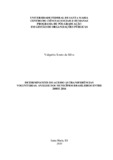| dc.creator | Silva, Valquíria Souto da | |
| dc.date.accessioned | 2021-05-06T19:52:43Z | |
| dc.date.available | 2021-05-06T19:52:43Z | |
| dc.date.issued | 2019-07-15 | |
| dc.identifier.uri | http://repositorio.ufsm.br/handle/1/20806 | |
| dc.description.abstract | The intergovernmental transfers are contained in a system of rules that organize the responsabilities on the collection and the provision of public goods, denominated Fiscal Federalism. In Brazil, tax competencies are mostly concentrated in the federal government, with intergovernmental transfers taking on a role of reallocating resources in states and municipalities, since the distribution of resources between the entities is heterogeneous. From this context, the objective was to analyze the factors that determined the access to the voluntary transfers of the Federal Union, from 2008 to 2016. For this, the panel regression method was used from the definition of Technical, Political and Redistributive Factors in access to resources of voluntary nature. For the Technical, although a large number of municipalities have participated in the process, the fact of presenting a proposal to become a subscriptor did not show to be a relevant item to achieve better performance; still, part of the state capacity indicators demonstrated that the autonomy and professionalization of bureaucracy negatively influenced the funding process. In the Politician, the occurrence of presidential elections positively influences the volume of resources transferred to the municipalities while the holding of local elections negatively impacted the decentralization of these resources, which may be an indication that in years where local governments either end their mandates or are working for their reelections, subscription process is reduced. And, regarding the Redistributive, the voluntary transfers behaved as a distributive and not a redistributive policy, since the results point to the prioritization of municipalities with lower rates of human development or that have low municipal self-revenue rates. | eng |
| dc.language | por | por |
| dc.publisher | Universidade Federal de Santa Maria | por |
| dc.rights | Attribution-NonCommercial-NoDerivatives 4.0 International | * |
| dc.rights.uri | http://creativecommons.org/licenses/by-nc-nd/4.0/ | * |
| dc.subject | Federalismo fiscal | por |
| dc.subject | Transferências voluntárias | por |
| dc.subject | Municípios brasileiros | por |
| dc.subject | Fiscal federalism | eng |
| dc.subject | Voluntary transfers | eng |
| dc.subject | Brazilian municipalities | eng |
| dc.title | Determinantes do acesso às transferências voluntárias: análise dos municípios brasileiros entre 2008 e 2016 | por |
| dc.title.alternative | Determinants of access to voluntary transfers: analysis of brazilian municipalities between 2008 and 2016 | eng |
| dc.type | Dissertação | por |
| dc.description.resumo | As transferências intergovernamentais estão contidas em um sistema de regras que organiza as responsabilidades sobre a arrecadação e a provisão de bens públicos, denominado de Federalismo Fiscal. No Brasil, as competências tributárias são majoritariamente concentradas no Governo Federal, com as transferências intergovernamentais assumindo a função de realocar os recursos entre estados e municípios, porém a distribuição desses recursos entre os entes locais é heterogênea. A partir deste contexto, o objetivo consistiu em analisar os fatores que determinaram o acesso das transferências voluntárias da União entre os municípios brasileiros, no período de 2008 a 2016. Para isso, fez-se uso do método de regressão em painel e estatísticas descritivas, a partir da definição de Fatores Técnico, Político e Redistributivo no acesso aos recursos de natureza voluntária. Para o Técnico, embora um grande número de municípios participe do processo, o fato de apresentarem as propostas para conveniamento não se mostrou um aspecto relevante para obter um melhor desempenho; ainda, parte dos indicadores de capacidade estatal demostrou que a autonomia e a profissionalização da burocracia influenciou negativamente no processo de captação. No Político, a ocorrência de eleições presidenciais influenciou positivamente o volume de recursos transferidos aos municípios enquanto que a realização de eleições locais impactou de forma negativa a descentralização desses recursos, o que pode ser um indicativo de que em anos em que os governos locais encerram seus mandatos ou estão trabalhando para suas reeleições, o conveniamento é reduzido. E, quanto ao Redistributivo, as transferências voluntárias comportaram-se como política distributiva e não redistributiva, uma vez que os resultados apontam à priorização de municípios com menores índices de desenvolvimento humano ou ainda, que detenham baixos índices de receita própria municipal. | por |
| dc.contributor.advisor1 | Bender Filho, Reisoli | |
| dc.contributor.advisor1Lattes | http://lattes.cnpq.br/9794436610539367 | por |
| dc.contributor.referee1 | Coronel, Daniel Arruda | |
| dc.contributor.referee2 | Chieza, Rosa Angela | |
| dc.creator.Lattes | http://lattes.cnpq.br/4556995392989434 | por |
| dc.publisher.country | Brasil | por |
| dc.publisher.department | Administração Pública | por |
| dc.publisher.initials | UFSM | por |
| dc.publisher.program | Programa de Pós-Graduação em Gestão de Organizações Públicas | por |
| dc.subject.cnpq | CNPQ::CIENCIAS SOCIAIS APLICADAS::ADMINISTRACAO::ADMINISTRACAO PUBLICA | por |
| dc.publisher.unidade | Centro de Ciências Sociais e Humanas | por |



